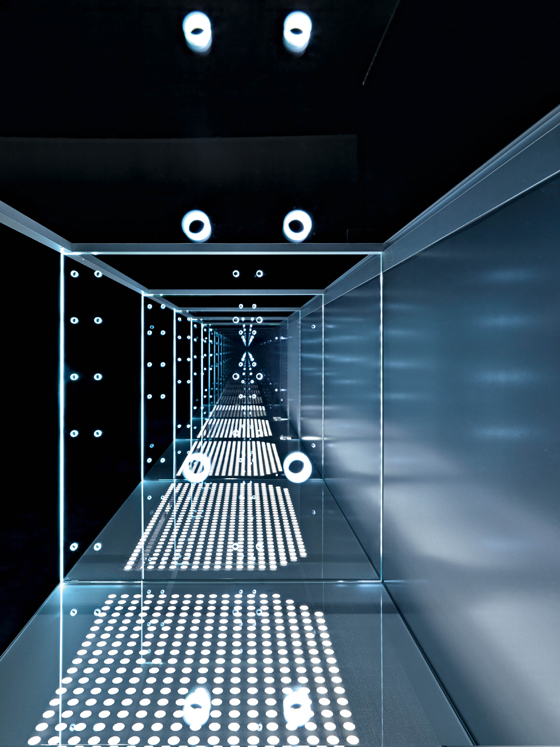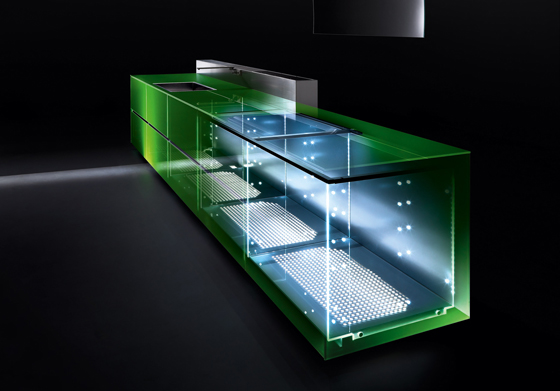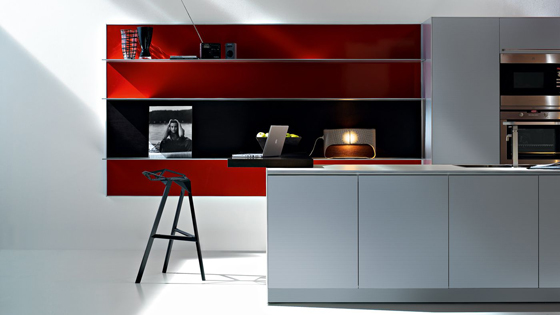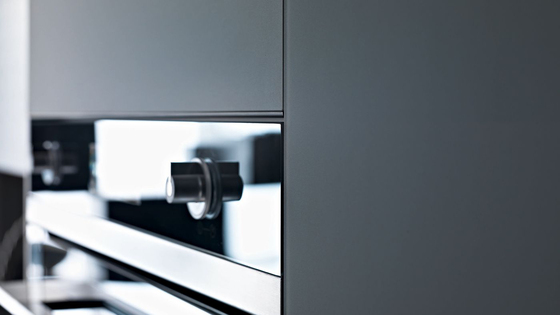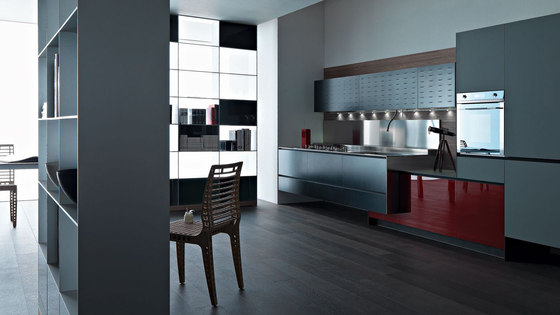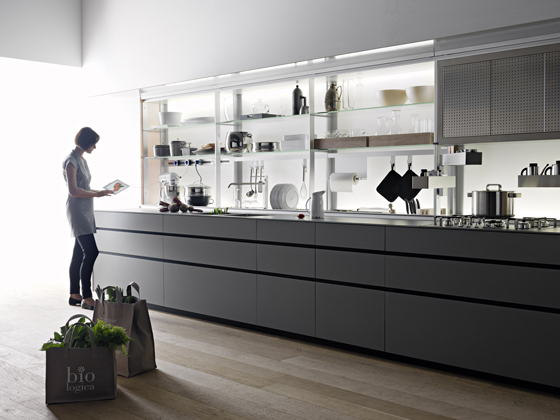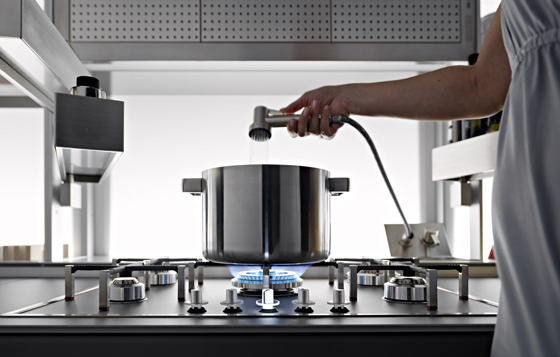Waste Not
Brand story by Simon Keane-Cowell
Pordenone, Italie
05.03.14
There's something cooking in the kitchen and we're not talking food. It's a revolution in product design, production and consumption. Respected Italian manufacturer VALCUCINE, whose brand has long been known for its craftsmanship and research-led ergonomics, is getting tough on waste.
....
....
A revolution in the kitchen: Valcucine's 'Invitrum' base units are the first 100% recyclable products of their kind in glass and recycled aluminium. Carcass sides measure a mere 10mm in thickness
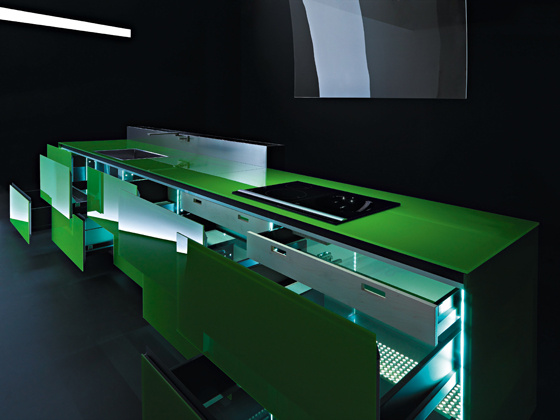
A revolution in the kitchen: Valcucine's 'Invitrum' base units are the first 100% recyclable products of their kind in glass and recycled aluminium. Carcass sides measure a mere 10mm in thickness
×Among the many pleasures one can experience vicariously, perhaps one of greatest is accompanying property-buying friends and family, with significantly more financial wherewithal than you, to viewings of houses for which, quite frankly, you’d have to sell a limb (or possibly two) to even be in with a chance of affording. I’ve been invited on several of these sorties of late, the friend in question being a hard woman to please.
What strikes me every time we arrive at a new candidate is the fact that my companion makes an immediate bee-line for the kitchen. Work surfaces are stroked. Oven doors opened. It’s clear that, regardless of the property’s architectural and spatial merits and particularities, it’s the kitchen that most often acts as gateway through which we’re able to visualise ourselves taking up residence. For many, my friend included, it has the potential of being a deal-clincher and a deal-breaker.
Warmth, food, comfort. It’s no wonder kitchens occupy a special status within the domestic realm, spaces in which a house becomes a home. But while they may offer their users the ability to come together and share, industrially produced kitchens are, some argue, performing this at the expense of the wider family unit – mankind. With their historically high environmental impact, the production, consumption and disposal of the modern kitchen – energy-consuming, waste-generating – has ramifications for all of us, whether we’re home-owners or not.
Easy disassembly of Valcucine's glass and reycled aluminium 'Invitrum' base units aids the company in its guarantee to customers to collect and recycle or reuse many of its product at the end of their life-span
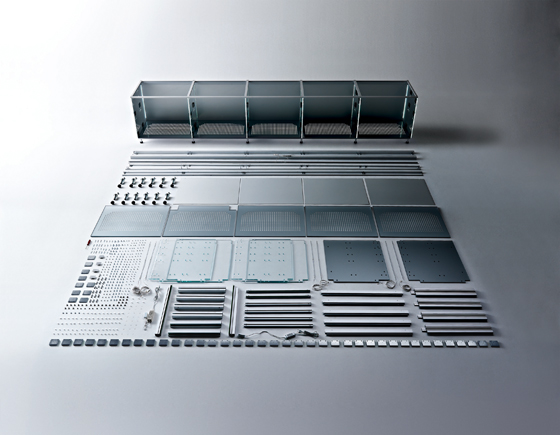
Easy disassembly of Valcucine's glass and reycled aluminium 'Invitrum' base units aids the company in its guarantee to customers to collect and recycle or reuse many of its product at the end of their life-span
×One manufacturer is following a different recipe book. High-end Italian brand Valcucine, long-known for the craftsmanship and ergonomics of its kitchen systems, decided some time ago to take a pioneering stance and introduce a revolutionary, ecologically sensitive model of design and production, one which considers the total life-cycle of their products. ‘It all started with the desire to produce in an eco-compatible way,’ explains Valcucine president Gabriele Centazzo. ‘The ethics of responsibility towards the environment have always guided our choices as a company and, more importantly, as the people who belong to it. Because beyond being a community heritage, the environment concerns each single person, it belongs to each one of us as an individual.’
Think green. Think trees. As aspirational metaphor for a more ecologically mindful kind of business, Valcucine has adopted the tree, with its zero-waste, zero-environmental-impact way of existing in the wider eco-system as their model. ‘A natural factory’ is how they describe it, with its use of renewable energy (in the form of the sun) and its all-natural materials – carbon dioxide, water and humus. In terms of its waste, there’s oxygen (which we need to live, of course), water vapour, which reappears later as rain, and leaves. The latter are transformed into nutrient-rich compost by the likes of worms and bacteria. It’s a perfect circle of taking and giving.
First launched in 1988, the 'Artematica' kitchen has been carrying the flag for sustainability-driven innovation for decades. Its doors are constructed from an aluminium frame invisible from the outside and a materials-saving 5mm-thick HPL panel
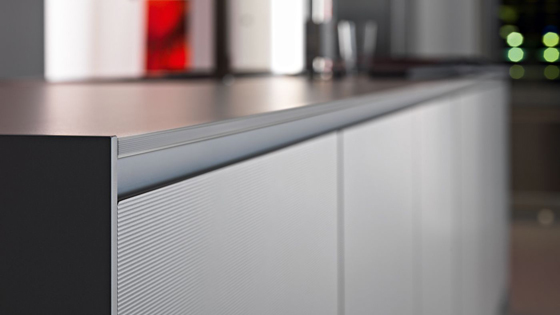
First launched in 1988, the 'Artematica' kitchen has been carrying the flag for sustainability-driven innovation for decades. Its doors are constructed from an aluminium frame invisible from the outside and a materials-saving 5mm-thick HPL panel
×While acknowledging that there’s no such thing as 100% sustainability if you’re engaged in the business of manufacturing things (at least at this point in time), Valcucine has nonetheless committed wholeheartedly to moving towards a waste-free modus operandi, applying the arboreal virtuous circle to what it makes and how it makes it. The key aspects of such an undertaking are dematerialisation (the minimisation of material usage), recycling and reusing, a reduction in toxic emissions and the guaranteeing of a long technical and aesthetic life to its products, the latter countering the long-established manufacturing strategy of built-in obsolescence.
A series of guarantees to customers underpin Valcucine's business, all designed to reflect sustainability as the ethically motivated company's key driver for innovation and success
To achieve this requires taking the road far less travelled and the company is under no illusions as to the difficulty of the terrain. But, ‘If I have made a promise and if I want to be true to the voice of my conscience, I must also be ready to face the difficulties this may imply,’ explains Centazzo. ‘I must be willing to go against the mainstream.’ Going against the mainstream in this case means implementing a holistic, cradle-to-cradle approach to design and manufacturing, once which covers not only the conditions of production and the choice of materials, but also accepts responsibility for what happens to products once they have come to the end of their, hopefully long-term, life-spans.
A stunning 2mm is all Valcucine's 'Riciclantica' kitchen doors measure in terms of thickness, bearing out the manufacturer's steadfast, sustainability-informed commitment to a reduction in the amount of materials used for production
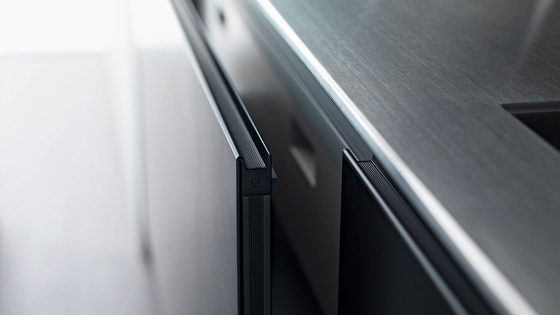
A stunning 2mm is all Valcucine's 'Riciclantica' kitchen doors measure in terms of thickness, bearing out the manufacturer's steadfast, sustainability-informed commitment to a reduction in the amount of materials used for production
×So, at Valcucine we see a raft of measures that include the use of wood that’s not sourced from primary forests and which is increasingly FSC-certified; 35% of the energy used for production coming from renewables; and the guarantee that the company will come and collect, free of charge, its glass and aluminium-carcassed systems from their owners once the products have reached the end of their life-cycle, taking them away for recycling or reuse, the latter being up to 80%. In an age where policies and strategies are picked up and put down according to the vicissitudes of business need, putting in place a cast-iron promise like this one (along with a number of other guarantees that include the availability for the next 20 years of all the elements required to modify or complete the particular kitchen programme you’ve purchased) is more than just lip-service and instead a commendable nailing of one’s colours to the mast.
Valcucine has adopted the tree ('a natural factory', as the company puts it) as aspirational metaphor for zero-waste production, something the brand is continuously moving towards
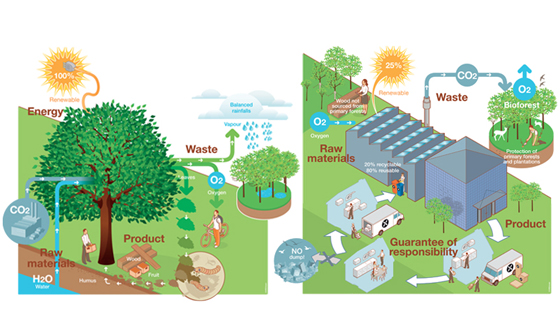
Valcucine has adopted the tree ('a natural factory', as the company puts it) as aspirational metaphor for zero-waste production, something the brand is continuously moving towards
×Yet how do you square such an ethical approach to design-manufacturing with long-term business viability? ‘Well, it’s certainly not a marketing move,’ says Valcucine’s Communications Manager Daniele Prosdocimo. ‘We just can’t expect our GDP to grow more and more without thinking about our future. Humanity’s total ecological footprint is already more than one and half times that of our planet’s. This means we have to change our patterns of behaviour, the way in which we produce and pollute.’ So you can’t be ethical and profitable at the same time? ‘There still aren’t common rules between economy and ecology,’ suggests Prosdocimo. ‘But Valcucine believes it’s important to take into consideration all stakeholders in a balanced way, with transparency, fairness and responsibility as the key drivers.’
Painstaking research underlies Valcucine's ergonomically fine-tuned 'New Logica System', which, with its new equipped back section, builds on its successful 1996 'Logica System', where efficiency and order are king
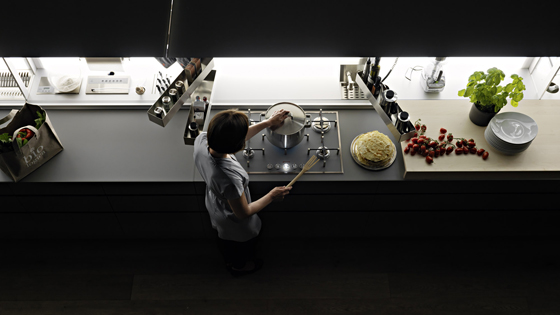
Painstaking research underlies Valcucine's ergonomically fine-tuned 'New Logica System', which, with its new equipped back section, builds on its successful 1996 'Logica System', where efficiency and order are king
×So what role does profit play in a company that has elected to put sustainability at the heart of its ongoing programme of innovation? Prosdocimo again: ‘Profit in the economic system is the normal result of good practices, but what is really important is how you secure profit, how you invest it and how you share it. Valcucine has always invested its profits to foster cultural processes and to defend the environment on behalf of employees, customers and community.’ The belief in not being guided by profit but, rather, profit resulting from ecologically minded best practice in manufacturing (‘not getting trapped in the logic of profit, but finding other paths to walk’, as Prosdocimo puts it) is one shared by all Valcucine employees, who are actively involved in promoting the sustainability agenda through events and the creating and sharing of content with their communities of colleagues, customers, dealers and architects. ‘Culture creates conscience,’ says Prosdocimo.
The 'New Logica System' features an 80cm-deep back section that can house a myriad equipment, such as small appliances, dish-drainers, weighing scales and cooking utensils, as well as taps, power sockets and cooker hoods
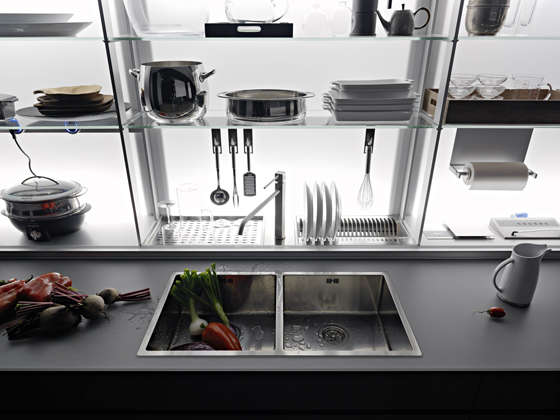
The 'New Logica System' features an 80cm-deep back section that can house a myriad equipment, such as small appliances, dish-drainers, weighing scales and cooking utensils, as well as taps, power sockets and cooker hoods
×For Valcucine, it all comes down, in a word, to responsibility. Responsibility to people and to the planet. Or, rather, ‘respons-ability’, as Centazzo explains. More than a neat little pun, it’s this concept of an active, ethically underpinned engagement with the challenges of doing business in sustainability-led way that’s seeing the company create a compelling new narrative in design-manufacturing, one that obliges everyone in their team to be ‘consciously and constantly creative, innovative and ready to improve our standards and find new, original solutions that allow us to remain unfailingly in the forefront’. If you’re still not entirely convinced, ask the Italian Head of State, Giorgio Napolitano, who presented Valcucine with the ‘Premio dei Premi’ award for its pioneering ‘business culture based on ethics, environmental friendliness and innovation’.
Things are definitely hotting up in the kitchen.
....
*VALCUCINE IN MILAN*
EuroCucina, Salone del Mobile
Valcucine will be returning to the Salone del Mobile this April after 12 years of showing in different venues outside the fair, such as Sala Valcucine at Eataly Milan Smeraldo, Piazza XXV Aprile.
Find Valcucine at EuroCucina at the Salone del Mobile in Hall 9, B09/C12.
....
Valcucine Showroom in Brera during Milan Design Week
KITCHEN BECOMES OPEN!
a workshop for innovation on Meccanica
(of demode engineered by Valcucine)
corso Garibaldi 99, Milan
Workshop: 6-11 April 2014
Exhibition: 11-13 April 2014


